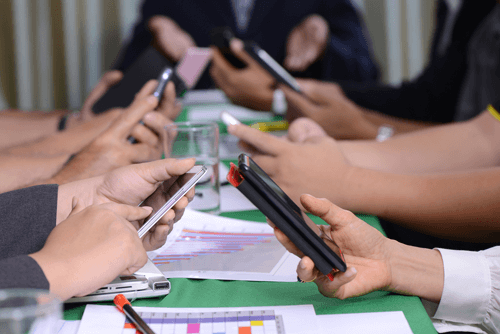Getting participants to focus on the same thing at the same time represents one of the hardest thing to accomplish with a group of people. Therefore, learning to remove distractions reflects a core skill and primary responsibility of the meeting leader.
Your Rosetta Stone: Remove Distractions
Remember that all questions you have about what you can or should do may be answered by the question, “Is it a distraction or not?” If it is not a distraction, then it should be acceptable. If it is a distraction, then it is your responsibility to remove distractions so that your group can remain focused on the topic.
For example, if you put your hands in your pocket to rest for a few minutes, it is probably OK. However, if you start juggling your keys or coins, the distraction is unacceptable. If a participant closes their eyes, let them rest. If they start snoring, then intervene to remove the distraction.
Core Skills Where You Need to Remove Distractions
As a facilitator, you need to manage four core skills including presentation, active listening, questioning, and observation/ neutrality. For these to be effective, you must reduce or eliminate distractions so that the group can stay focused.
These four core skills are critical to effective facilitation.
- Presentation skills are necessary for effective communication
- Active listening is a tool for effective understanding
- Questioning is a tool for effective information-gathering
- Neutrality is a tool for balance and integrity
Removing distractions is an essential discipline for core skills and may guide all of your behavior.
Note for example the challenges that correspond with the four skills:
- Verbal disfluencies and fillers such as saying “Uhm” too often
- Observing something else when the meeting participant is talking
- Providing answers rather than method
- Making judgments or using the word “I” too often
______
Don’t ruin your career by hosting bad meetings. Sign up for a workshop or send this to someone who should. MGRUSH workshops focus on meeting design and practice. Each person practices tools, methods, and activities every day during the week. Therefore, while some call this immersion, we call it the road to building high-value facilitation skills.
Our workshops also provide a superb way to earn up to 40 SEUs from the Scrum Alliance, 40 CDUs from IIBA, 40 Continuous Learning Points (CLPs) based on Federal Acquisition Certification Continuous Professional Learning Requirements using Training and Education activities, 40 Professional Development Units (PDUs) from SAVE International, as well as 4.0 CEUs for other professions. (See workshop and Reference Manual descriptions for details.)
Want a free 10-minute break timer? Sign up for our once-monthly newsletter HERE and receive a timer along with four other of our favorite facilitation tools, free.

Terrence Metz, president of MG RUSH Facilitation Training, was just 22-years-old and working as a Sales Engineer at Honeywell when he recognized a widespread problem—most meetings were ineffective and poorly led, wasting both time and company resources. However, he also observed meetings that worked. What set them apart? A well-prepared leader who structured the session to ensure participants contributed meaningfully and achieved clear outcomes.
Throughout his career, Metz, who earned an MBA from Kellogg (Northwestern University) experienced and also trained in various facilitation techniques. In 2004, he purchased MG RUSH where he shifted his focus toward improving established meeting designs and building a curriculum that would teach others how to lead, facilitate, and structure meetings that drive results. His expertise in training world-class facilitators led to the 2020 publication of Meetings That Get Results: A Guide to Building Better Meetings, a comprehensive resource on effectively building consensus.
Grounded in the principle that “nobody is smarter than everybody,” the book details the why, what, and how of building consensus when making decisions, planning, and solving problems. Along with a Participant’s Guide and supplemental workshops, it supports learning from foundational awareness to professional certification.
Metz’s first book, Change or Die: A Business Process Improvement Manual, tackled the challenges of process optimization. His upcoming book, Catalyst: Facilitating Innovation, focuses on meetings and workshops that don’t simply end when time runs out but conclude with actionable next steps and clear assignments—ensuring progress beyond discussions and ideas.




